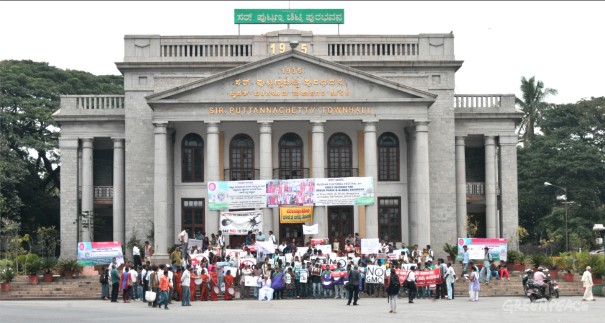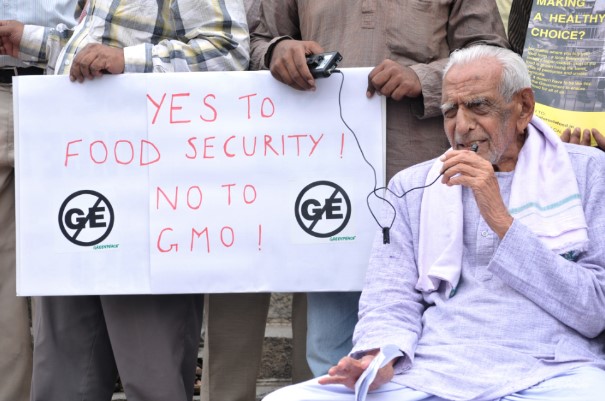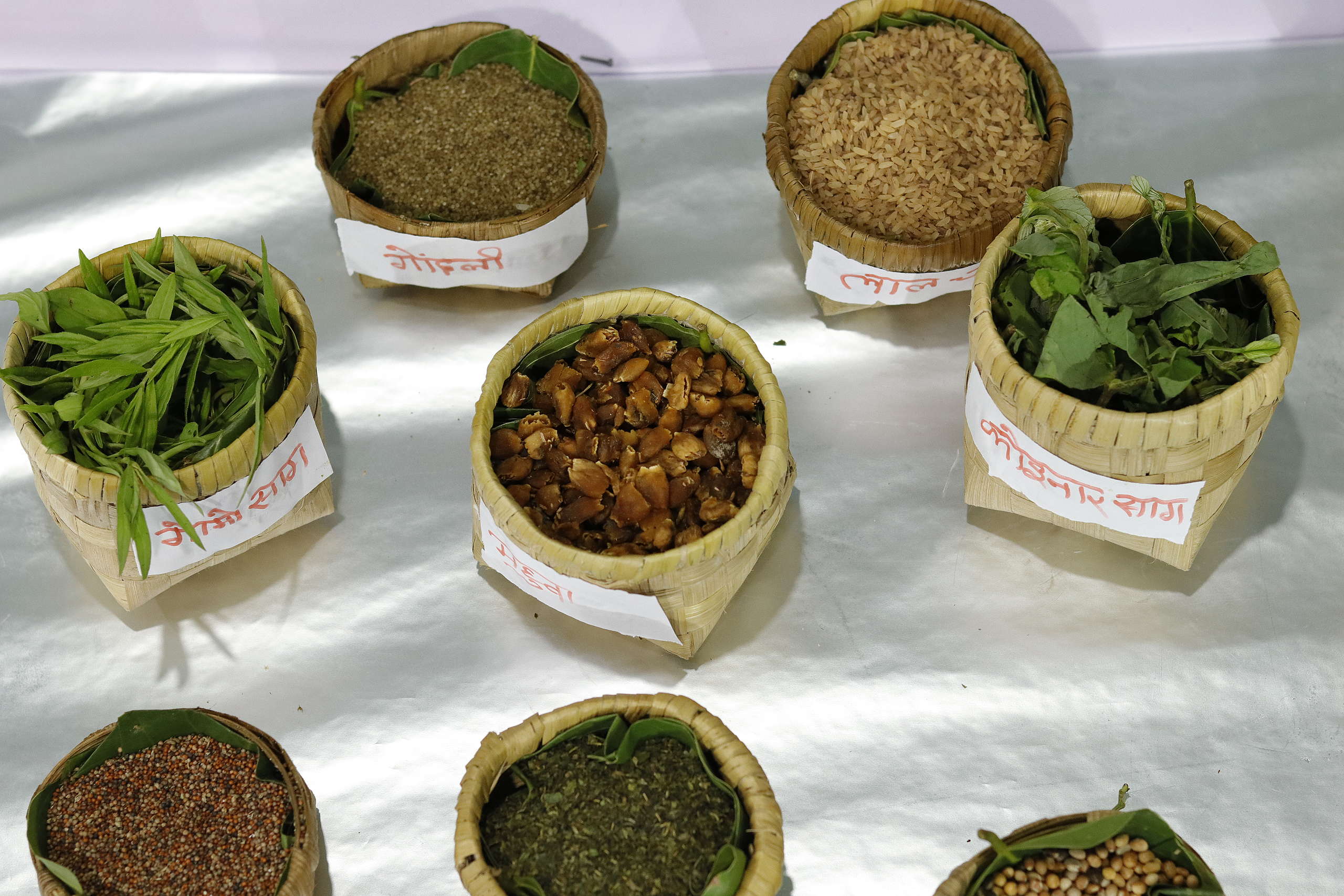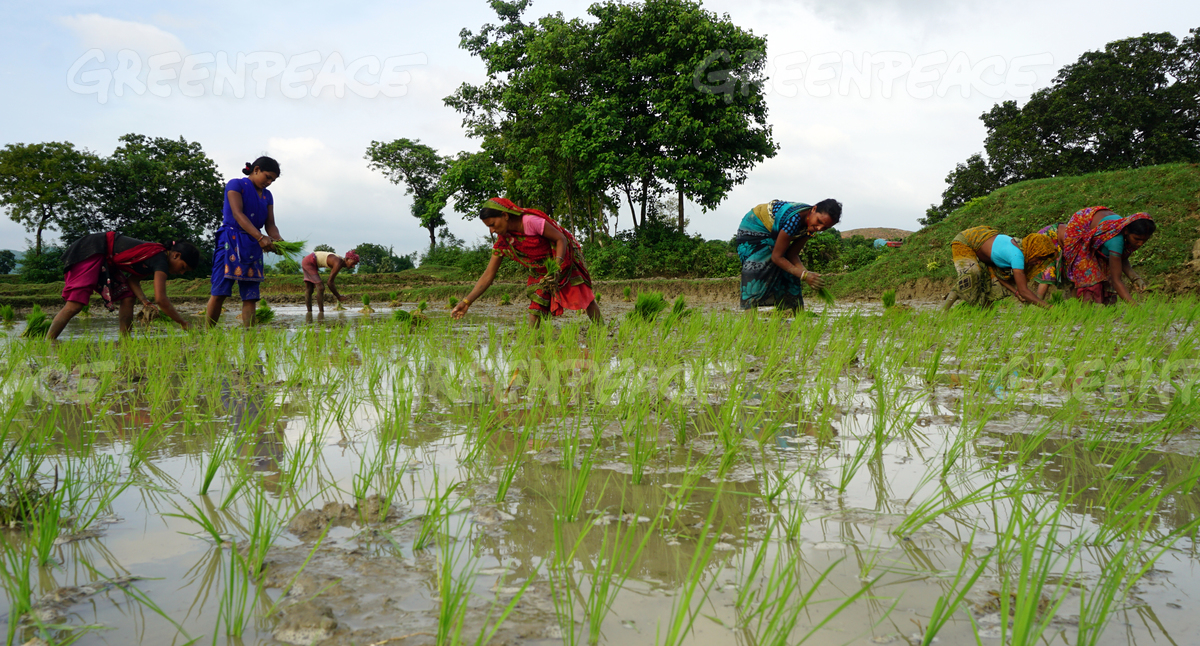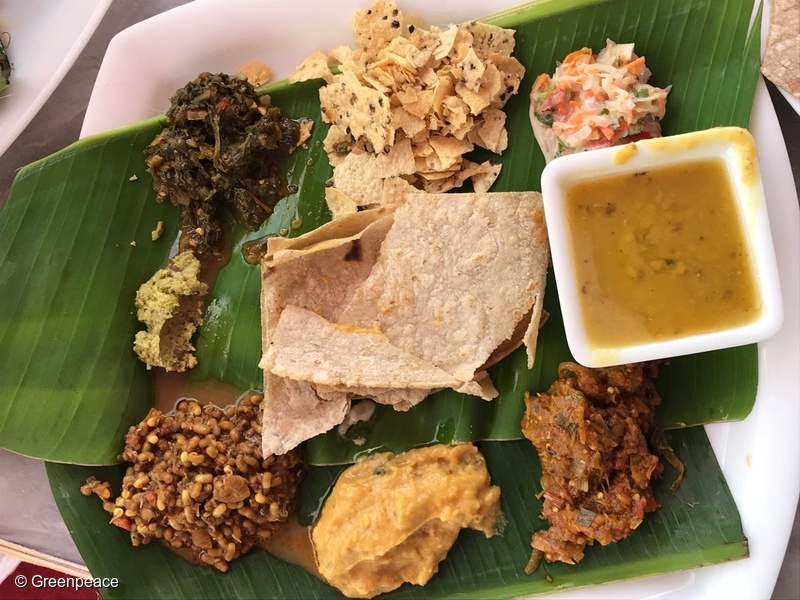Farmers, scientists, students and activists gathered in front of the Town Hall in Bangalore to proclaim their rejection of GMO’s and Monsanto. © Kenaz Mathew/Greenpeace
The gathering raised slogans against Genetically Modified (GM) crops and Monsanto and sang songs about the need for ecological farming. ‘Monsanto go back’ was a strong sentiment throughout the event and people of all ages echoed this call. Activists also performed a short street play to depict the dangers of GMO’s and corporatisation of our food systems. Several activists also spoke about the current scenario with GMO’s in India.
Inaugurating the public action against Monsanto, veteran freedom fighter and Gandhian, H.S Doraiswamy urged everybody to continue the struggle to keep our food and farming free from the clutches of profit hungry multinationals like Monsanto. Reminding the gathering about our freedom movement he said, “The very cotton that Gandhiji used as a weapon for our freedom struggle against the British Raj is now totally under the control of an American multinational, Monsanto. This they did through aggressive marketing tactics of their proprietary GM Bt cotton, the only GM crop commercially cultivated in our country. After gaining total control over cotton seeds they are now aiming to get control over our food crops and that needs to be stopped at any cost.”
Freedom fighter and Gandhian, H.S Doraiswamy urged everybody to continue the struggle to keep our food and farming free from corporate control. © Kenaz Mathew/Greenpeace
Currently Monsanto controls 95 % of the cotton seeds in India. Their Bt cotton has failed miserably and farmer suicides have increased in regions like Maharashtra were Bt cotton was introduced. Highlighting it’s massive failure in Karnataka Anekatti Vishwanath, farmer leader from Dodballapur near Bangalore said, “The Bt cotton myth has been broken. It has neither increased the yields nor has it brought down the pesticide use. All that it has done is to give the entire cotton seed market into the hands of Monsanto which has earned hundreds of crores as royalties from our farmers. The tragedy is that our own government and public sector agriculture institutions are hand in glow in this fraud.”
He further demanded the state government to immediately conduct an investigation into the failure of Bt cotton in the state and blacklist companies like Monsanto who have caused severe distress to poor farmers in Karnataka.
On 11th October 2013, the Karnataka High Court had dismissed petitions that challenged criminal prosecution of top officials of Monsanto/Mahyco and University of Agricultural Sciences, Dharward who have been accused of the egregious crime of biopiracy in promotion of Bt Brinjal, India’s first GM food crop. Speaking from the event, Leo Saldanha from the Environment Support Group (ESG) which first exposed this serious crime said, “Monsanto has historically worked to take away control over seeds from local farming communities as an integral part of their business model. Now they have been caught red handed illegally appropriating brinjal varieties endemic to India and which constitute our biodiversity heritage. We will continue to closely monitor efforts of national and state biopiracy regulatory agencies to ensure the criminal proceedings against the corporation and collaborating institutions reaches its logical end.”
Around the world, Monsanto has been removed and banned from several countries like Germany, Russia, Japan, New Zealand, France, Switzerland etc.In India, Monsanto is still vying to get complete control over our seeds and farming to maximise their profits. Neha Saigal, Sustainable Agriculture campaigner, Greenpeace India, says, “On the one hand scientific evidence on adverse impacts of GM crops on human health, environment and farm livelihoods are increasing by the day and on the other hand our central government is out on a limb to push GM crops into our farms and plates. The latest in these efforts is the Biotechnology Regulatory Authority of India (BRAI) Bill which has been introduced in the last session of the parliament. The bill proposes to create a single window clearance system which is designed for easy approval of GM crops. This is nothing but a Monsanto protection and Promotion law.”
It is imperative that the BRAI bill is withdrawn because it will facilitate the fast track entry of GM food crops into our agriculture and lower the bar for GM crop approvals with no independent long-term studies on their safety.
The theme of this year’s World Food Day is ‘Sustainable Food systems for food security and Nutrition’. Let’s not forget that we cannot afford to leave our health and the safety of the food we eat to corporations whose only driving force is growth and profit. Sustainable agriculture can create enough healthy food for our population while also safeguarding the environment and our farmer’s livelihoods. Until the government promotes sustainable agriculture over dangerous technologies like GM crops it is our responsibility to protest all across the country.

